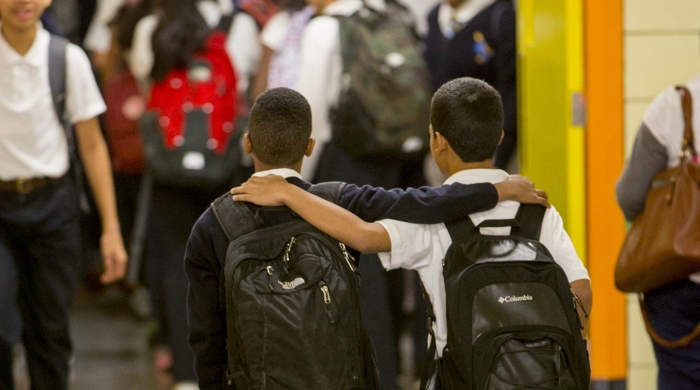This summer, two Steinhardt scholars were invited to present at a meeting of the NYC Racial Justice Commission focused on "Eradicating Education Inequity for BIPOC (Black, Indigenous, and People of Color)."
Jim Kemple, executive director of the Research Alliance for New York City Schools, and David Kirkland, executive director of The NYU Metropolitan Center for Research on Equity and The Transformation of Schools, were both invited to appear before the commission to offer their informed thoughts on how government can transform to overcome inequality for BIPOC New Yorkers, families, and communities in areas of education, school support, and success outside schools.
This was the Commission’s second panel in their “Transforming Foundations” series, a sequence of virtual panel discussions hosted by the Commission that brings in guest practitioners to talk about what is necessary to deflect systemic racism and make racial equity in areas such as health, education, housing, and economic justice a reality in New York City. Other topics within the series include “Intersectionality—Equity Across Identities” and “Achieving Economic Equity and Closing the Racial Wealth Gap.”
“Each week, commissioners are engaging with thought leaders to gain and better understand ideas for transforming the city’s foundational laws to embody racial justice and fairness,” said Commission Chair Jennifer Jones Austin.

Input from Steinhardt Faculty
In his remarks, Kemple set the context for the role of education in promoting racial justice and equity and suggested a framework for enhancing those efforts:
- Building a robust system of education equity indicators – focused on opportunities and resources, not just outcomes – and making the information public
- Disproportionately investing and building capacity in schools and communities with the highest levels of need
- Leveraging promising innovations from the last year – such as teachers’ expanded use of technology and improvements in students’ access to devices and the internet – and utilizing research to monitor the effectiveness of these initiatives
“New York City could be unusually well positioned to tackle cross-cutting inequalities,” said Kemple. “Mayoral control makes it possible to link education reform to reforms in other systems – and to assess how policies and practices throughout City government either undermine or support young people’s development and academic success.”
Kemple’s recommendations were born out of the Research Alliance’s recent policy brief, Blueprint for Advancing Equity in NYC Schools – yet more evidence of how work at NYU Steinhardt is making an impact on the education industry and the lives of students.
“At every level of schooling, there have been large, persistent disparities linked to [New York City] students’ race, ethnicity, and neighborhood,” the report said. “These are rooted in longstanding racial and economic inequalities that have been exacerbated by COVID-19. [This report] outlines recommendations for how City and District leaders can take a more demanding approach to advancing equity, while sustaining the progress that has been made during the last 20 years.”
Later in the discussion, Kirkland offered his thoughts on the fight to advance equity in education – a topic on which the NYU Metro Center focuses a number of research studies.
“The question isn’t the deficit of solutions and ideas; the question is how we get the solutions to the people,” said Kirkland. “How do we make education more culturally responsive and sustaining and reimagine all of our students and our communities, particularly our racially vulnerable students? … In our racial justice work moving forward, we have to center BIPOC students more. We have to give these young people the schools they deserve, or – better yet – creating schools that deserve [them].”
Other panelists for "Eradicating Education Inequity for BIPOC” also included representatives from Eagle Academy Foundation, The Asian American Education Project, Prep for Prep, and Advocates for Children, to name a few. You can watch a recording of the entire discussion on the NYC Racial Justice Commission YouTube Channel.
Related Research
Metropolitan Center for Research on Equity and the Transformation of Schools
We commit to social justice and the amplification of youth, parents, and community voices
The Research Alliance for New York City Schools
The Research Alliance for New York City Schools conducts rigorous studies on topics that matter to the city’s public schools. We strive to advance equity and excellence in education by providing nonpartisan evidence about policies and practices that promote students' development and academic success.

